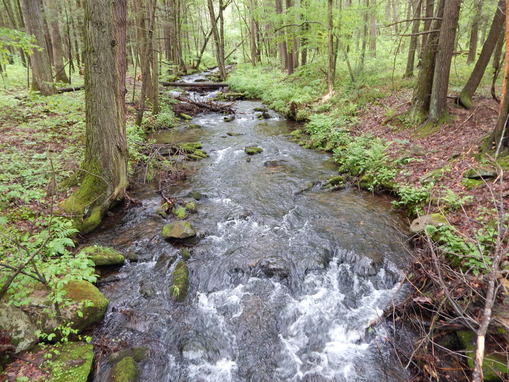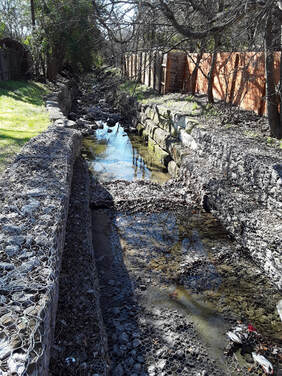
Welcome to all things ecology research, outreach, and education!
I am the External Monitoring and Data Coordinator with the Massachusetts Department of Environmental Protection - Watershed Planning Program. I am tasked with developing programs to support community monitoring of the Commonwealth's inland and coastal surface waters and developing approaches for assessing water quality. I made the switch to an agency work for several professional and personal reasons, but big part of my decision was to work at the forefront of conservation action. I am still research active, but I decided that my research, outreach, and education expertise in ecology could lead to measurable benefits to aquatic conservation by working for a state agency. I'm excited for what the next chapter holds in my career.
I am a native Pennsylvanian who received a B.S. in Biology from Millersville University and my M.S. and Ph.D. in Entomology from the University of Maryland. I worked for 3 years as an NSF Science, Engineering, and Education for Sustainability Postdoctoral Fellow for the Massachusetts Cooperative Fish and Wildlife Research Unit. I also worked for a year as a visiting professor at the Biology Department, at the College of the Holy Cross in Worcester, MA. Most recently, I worked as an assistant professor at Lycoming College where I taught undergraduate courses in ecology, environmental science, aquatic biology, and GIS, and performed research on aquatic and terrestrial systems.
I am the External Monitoring and Data Coordinator with the Massachusetts Department of Environmental Protection - Watershed Planning Program. I am tasked with developing programs to support community monitoring of the Commonwealth's inland and coastal surface waters and developing approaches for assessing water quality. I made the switch to an agency work for several professional and personal reasons, but big part of my decision was to work at the forefront of conservation action. I am still research active, but I decided that my research, outreach, and education expertise in ecology could lead to measurable benefits to aquatic conservation by working for a state agency. I'm excited for what the next chapter holds in my career.
I am a native Pennsylvanian who received a B.S. in Biology from Millersville University and my M.S. and Ph.D. in Entomology from the University of Maryland. I worked for 3 years as an NSF Science, Engineering, and Education for Sustainability Postdoctoral Fellow for the Massachusetts Cooperative Fish and Wildlife Research Unit. I also worked for a year as a visiting professor at the Biology Department, at the College of the Holy Cross in Worcester, MA. Most recently, I worked as an assistant professor at Lycoming College where I taught undergraduate courses in ecology, environmental science, aquatic biology, and GIS, and performed research on aquatic and terrestrial systems.

So, given all these experience, "who am I"?
I am an aquatic ecologist with broad knowledge of streams and wetlands in natural and human-dominated systems. The student-centered research I've mentored was unified by a) approaches that emphasize basic ecological principles and b) a focus on addressing conservation needs in a changing global environment due to urban development and climate change. This unifying theme is exactly the needed perspective for contemporary conservation work in state agencies. I will always hold near and dear my expertise in the biology and taxonomy of aquatic insects, which I have successfully used for basic and applied research in community ecology, phenology, dispersal, and life-history processes. Over time, I developed an interest in using GIS and quantitative approaches to examine ecological systems at small to broad spatial scales. I have a unique ability to combine my understanding of organismal biology and landscape ecology to study ecological patterns and processes of the built environment needed to inform restoration and management. My research on urban systems evolved to employ an interdisciplinary and collaborative approach to examine the social context of streams and rivers in urban landscapes. A holistic understanding of the ecological and socio-economic mechanisms driving human impacts on aquatic systems and incorporating community knowledge and values in restoration projects is required for effective and equitable approaches to managing urban ecosystems.
On this website, you will find information about my former research and teaching programs that I hope can be useful to others in academia. I will also post information about the community monitoring and outreach programs I create with the MassDEP. Please feel free to contact me at [email protected] if you have any questions or comments about my work. Follow me on Twitter: @rfsmithecology.
I am an aquatic ecologist with broad knowledge of streams and wetlands in natural and human-dominated systems. The student-centered research I've mentored was unified by a) approaches that emphasize basic ecological principles and b) a focus on addressing conservation needs in a changing global environment due to urban development and climate change. This unifying theme is exactly the needed perspective for contemporary conservation work in state agencies. I will always hold near and dear my expertise in the biology and taxonomy of aquatic insects, which I have successfully used for basic and applied research in community ecology, phenology, dispersal, and life-history processes. Over time, I developed an interest in using GIS and quantitative approaches to examine ecological systems at small to broad spatial scales. I have a unique ability to combine my understanding of organismal biology and landscape ecology to study ecological patterns and processes of the built environment needed to inform restoration and management. My research on urban systems evolved to employ an interdisciplinary and collaborative approach to examine the social context of streams and rivers in urban landscapes. A holistic understanding of the ecological and socio-economic mechanisms driving human impacts on aquatic systems and incorporating community knowledge and values in restoration projects is required for effective and equitable approaches to managing urban ecosystems.
On this website, you will find information about my former research and teaching programs that I hope can be useful to others in academia. I will also post information about the community monitoring and outreach programs I create with the MassDEP. Please feel free to contact me at [email protected] if you have any questions or comments about my work. Follow me on Twitter: @rfsmithecology.